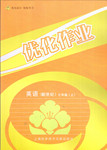题目内容
The law requires equal treatment for all, ________ race, religion, or sex.
[ ]
A.regardless of
B.in place of
C.in case of
D.as a result of
答案:A

练习册系列答案
 培优三好生系列答案
培优三好生系列答案 优化作业上海科技文献出版社系列答案
优化作业上海科技文献出版社系列答案
相关题目
According to the law, it is _____ get your driving license.
|
A.not until you’re eighteen can you |
B.until you’re eighteen that you can’t |
|
C.not until you’re eighteen that you can |
D.until you’re eighteen when you can’t |